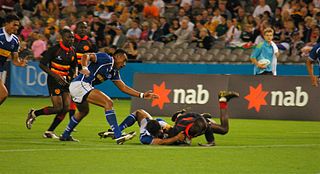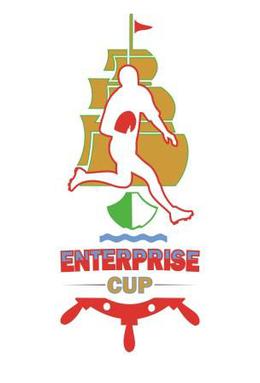
The Kenya national rugby union team, commonly known as the Simbas, is the country's national team managed by the Kenya Rugby Union. The team plays in red, green, and black jerseys with black or white shorts. The Simbas represent Kenya in the Africa Cup and various other tournaments across the continent. They currently rank 34 in the World Rugby Rankings and fourth in Africa. Kenya is yet to qualify for the Rugby World Cup.

Rugby union in Kenya is a popular sport, in particular due to the success of the Kenya national rugby sevens team in the rugby sevens format, and tournaments such as the Safari Sevens, which has been growing yearly, and now includes numerous international teams.

Bamburi Cement Limited is an industrial company in Kenya specialising in cement and concrete. The company has operations in Bamburi suburb of Mombasa, it is headquartered in Nairobi and its stock is listed on the Nairobi Securities Exchange.

The Tanzania national rugby union team represents Tanzania in international rugby union. They are known as the Twigas. Tanzania is a member of the International Rugby Board.

The Elgon Cup is contested between the rugby union teams of Kenya and Uganda. The men's and women's teams of these countries each compete annually for their respective cups on a Home-and-Away basis. The competition and the cups are named after Mount Elgon, a mountain on the border of the two countries.

Rugby union in Uganda has been played since colonial times when it was introduced by the British. The governing body is the Uganda Rugby Football Union.
Cricket is a popular sport in Kenya. Kenya has competed in the Cricket World Cup since 1996. They upset some of the world's best teams and reached semi-finals of the 2003 tournament. They also won the inaugural World Cricket League Division 1 hosted in Nairobi and participated in the World T20. Their most successful player is Steve Tikolo, who captained the team to the semi-finals of the 2003 Cricket World Cup

Established in 1950, the East Africa rugby union team is a multi-national rugby union team drawing players from Kenya, Uganda and Tanzania, though the vast majority of these came from Kenya which has traditionally been the strongest rugby playing nation in the region. The team has played against incoming international, representative and club touring sides and it conducted seven tours between 1954 and 1982.

The RFUEA Ground is a rugby union stadium located on the Ngong Road in Nairobi, Kenya. It was purpose built to be the home of the national team and to serve as the headquarters of the Rugby Football Union of Kenya (RFUK). Coincidentally, the RFUEA ground has another parallel with Twickenham Stadium in the United Kingdom in that it also serves as the home ground for the Kenya Harlequin Football Club, just as their sister club the London Harlequins once played at Twickenham.

Kenya Harlequin Football Club, is a Kenyan rugby union club that competes in the Kenya Cup, the top level of Kenyan rugby. The club motto "Nunquam Dormio" is Latin, meaning I never sleep.

The Rugby Football Union of East Africa (RFUEA) is an umbrella union for the Kenya Rugby Football Union, Tanzania Rugby Football Union and Uganda Rugby Football Union. It owes its existence to the fact that, prior to independence, Kenya, Tanzania and Uganda were either a protectorate or mandate of the British Empire. It now has little to do with the direct administration of the modern game but it continues to exist in order to promote and support the game in the three countries, to facilitate club competition between the three unions and to administer the RFUEA Ground and the East Africa rugby union team.

Homeboyz Rugby Football Club is a rugby union club based in Nairobi, Kenya, that competes in the Kenya Cup, Eric Shirley Shield, Enterprise Cup and Mwamba Cup. Formed in 2009, Homeboyz also has a women's team that competes in the Kenya Rugby Football Union women's league every year. Both the men's and women's teams also compete in the Kenya National Sevens Circuit that happens annually. Their main home ground is Jamhuri Park.

The Enterprise Cup is an annual rugby union competition in Kenya, Tanzania and Uganda, though the competition frequently has the appearance of being an all-Kenyan affair as the majority of rugby clubs in the African Great Lakes region are based in this one country and frequently clubs in Tanzania and Uganda are unable to take part due to financial constraints. The original cup was donated by sailors from HMS Enterprise, who had toured British East Africa in 1928. The only years in which the competition has not been played is between 1940–1946 due to World War II and in 1987 because an international rugby competition was held on RFUEA Ground as part of the All Africa Games.
Rugby union in East Africa is almost entirely an amateur sport. It has been played in the three East African nations for more than a century; the first recorded match taking place in 1909, though it was almost certainly being played for several years prior to this. There are many club and school teams, the oldest of which were established in Colonial times.
Imperial Bank Limited commonly known as Imperial Bank, is a commercial bank in Kenya, the largest economy in the East African Community. It is one of the forty-three commercial banks licensed by the Central Bank of Kenya, the central bank and national banking regulator.
The 2011 Safari Sevens were the 16th annual edition of the Safari Sevens.

Kisumu Rugby Football Club is a Kenyan rugby union club based in Kisumu. Also known as Lakeside RFC, for the 2015–16 season the club competes in the Nationwide League.

This article describes energy and electricity production, consumption, import and export in Kenya. Kenya's current effective installed electricity capacity is 2,651 megawatts (MW), with peak demand of 1,912 MW, as of November 2019. At that time, demand was rising at a calculated rate of 3.6 percent annually, given that peak demand was 1,770 MW, at the beginning of 2018. Electricity supply is mostly generated by renewable sources with the majority coming from geothermal power and hydroelectricity.

TransCentury Limited is an infrastructure company whose stock is "listed on the Nairobi Securities Exchange (NSE) with three divisions across 14 countries in East, Central and Southern Africa".
The Nationwide League is a domestic Kenyan rugby union competition. Full members of the Kenya Rugby Union that do not participate in the top tier Kenya Cup are entitled to participate in the league. It operates in a system of promotion and relegation with the Kenya Cup. Matches are played on Saturday afternoons, usually before fixtures in the Kenya Cup.














